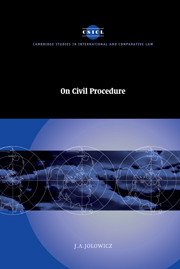Book contents
- Frontmatter
- Contents
- Preface
- List of abbreviations
- Introduction
- I The litigation process
- II Protection of diffuse, fragmented and collective interests
- III Procedural modes
- IV The parties and the judge
- V Recourse against judgments
- 14 Civil appeals in England and Wales
- 15 Appeal, cassation, amparo and all that: what and why?
- 16 Managing overload in appellate courts: ‘Western’ countries
- VI Procedural reform
- Index
- CAMBRIDGE STUIDES IN INTERNATIONAL AND COMPARATIVE LAW
16 - Managing overload in appellate courts: ‘Western’ countries
from V - Recourse against judgments
Published online by Cambridge University Press: 18 December 2009
- Frontmatter
- Contents
- Preface
- List of abbreviations
- Introduction
- I The litigation process
- II Protection of diffuse, fragmented and collective interests
- III Procedural modes
- IV The parties and the judge
- V Recourse against judgments
- 14 Civil appeals in England and Wales
- 15 Appeal, cassation, amparo and all that: what and why?
- 16 Managing overload in appellate courts: ‘Western’ countries
- VI Procedural reform
- Index
- CAMBRIDGE STUIDES IN INTERNATIONAL AND COMPARATIVE LAW
Summary
The individual reports used in preparation of the original version of this chapter reveal so great a variety of appellate systems that it is difficult to find common ground on which to base a comparative account of the problem of overload and its management. There are systems which distinguish sharply between appeal and cassation; there are federal systems in which the federal supreme court acts as the final court of appeal for the whole country and others in which it acts only in federal cases; there are systems which, though unitary, have separate jurisdictions for private and for public law cases, and others with a unified hierarchy of courts: there are systems with one tier only after first instance, and others with two or even more; there are systems in which the appeal has a suspensive effect and others in which first instance judgments are enforceable as soon as given.
Even more striking than these specific differences is the difference in the volume of appellate work in countries of roughly comparable size, and in their attitudes to the right of appeal and to possible limitations of it. So, to take a dramatic example, in England the House of Lords has jurisdiction in public as well as private law, has a mere twelve full-time judges, is not divided into chambers, is a court of appeal not cassation, and delivers judgment in about fifty civil cases a year.
- Type
- Chapter
- Information
- On Civil Procedure , pp. 328 - 352Publisher: Cambridge University PressPrint publication year: 2000
- 4
- Cited by



